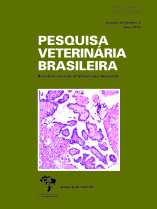 |
|
|
|
Year 2019 - Volume 39, Number 6
|

|
Non-invasive ECG recording and QT interval correction assessment in anesthetized rats and mice, 39(6):409-415
|
ABSTRACT.- Botelho A.F.M., Joviano-Santos J.V., Santos-Miranda A., Menezes-Filho J.E.R., Soto-Blanco B., Cruz J.S., Guatimosim G. & Melo M.M. 2019. Non-invasive ECG recording and QT interval correction assessment in anesthetized rats and mice. Pesquisa Veterinária Brasileira 39(6):409-415. Departamento de Clínica e Cirurgia Veterinária, Escola de Veterinária, Universidade Federal de Minas Gerais, Av. Antônio Carlos 6627, Belo Horizonte, MG 30123-970, Brazil. E-mail: mariliamm@ufmg.br
Rats and mice are the most common species used in experimental cardiac electrophysiology studies. Electrocardiogram (ECG) recording shows paramount importance for monitoring arrhythmias and cardiac function in several disease models, including QT syndrome. However, the lack of standardized reference values and QT correction formula for different animal species and lineages represent a challenge for ECG interpretation. The aim of this study is to provide an improved method for ECG recording, establishing reference range values and determine the QT formulas with higher correlation to heart rate (HR). A total of 10 Wistar rats, 10 Swiss mice, 10 C57BL/6 mice and 10 FVB/NJ mice were used in the study. Animals were submitted to anesthesia with isoflurane and ECG recording was performed using a six-channel non-invasive electrocardiograph. QT was corrected using the following formulas: Bazzett, Fridericia, Mitchell, Hodges, Van der Water and Framingham. Normal range values for ECG parameters were established in all animals studied. Pearsons’ correlation defined Hodges formula as the most suitable for QT correction. This study demonstrated an improved method of ECG recording with reference values for Swiss, FVB/NJ, C57BL/6 mice, and Wistar rats. Hodges’ formula was the most effective formula for QT correction in rodents, whereas Bazett’s and Friderica formulas were ineffective for such animals. The present work contributes to arrhythmias investigation in experimental cardiology and may reduce misinterpretations in rodents’ ECG |
| |
|
|
| |
|
 |